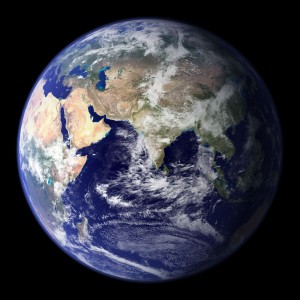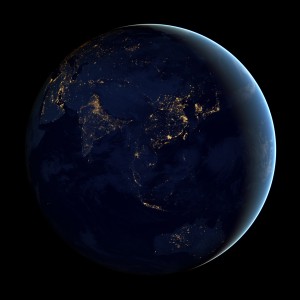22 April 2016
Action on climate change needs our hearts and heads: uniting our faith and science
Posted by Olivia Ambrogio
By Katharine Hayhoe, Asma Mahdi, Ed Maurer, and Vaishali Naik

NASA Goddard Space Flight Center Image by Reto Stöckli. Enhancements by Robert Simmon (ocean color, compositing, 3D globes, animation). Data and technical support: MODIS Land Group; MODIS Science Data Support Team; MODIS Atmosphere Group; MODIS Ocean Group.
We scientists are eyewitnesses to the changes occurring in our world. Every month, it seems, a new record is being broken: whether for global temperature, Greenland ice melt, hurricane intensification, heavy rainfall, or devastating heat waves.
Our science can clearly document how climate is changing. It can meticulously examine all relevant forcings to show that– for the first time ever – humans are the primary drivers of this change. And science can quantify the implications of our choices, providing valuable input into resilient public policy and sound decision-making in a time of rapid change. But science cannot tell us the right decision to make.
Which global target will avoid “dangerous anthropogenic interference with the climate system”? For some, the impacts are already dangerous; for others, the danger is still far in the future. What’s the best way to achieve such a target? Some argue carrots and incentives, others taxes and sticks. And on a personal level, should I fly to that conference, or stay home? Or at what point do I leave behind the massive footprint of my U.S. lifestyle, to adopt a more simple, sustainable life elsewhere?
In the real world, it’s rare that science can isolate the correct response. More often, we make our tough decisions informed, we hope, by the data and facts in our heads; but ultimately guided by where our values lie, in our hearts. And for religious people around the world, what’s in our hearts often has a great deal to do with our faith.
That’s why, for Faith Climate Action Week, four of us from four very different faith traditions have asked ourselves:
“As a scientist and a person of faith, why does climate change matter to me?”

NASA Earth Observatory image by Robert Simmon, using Suomi NPP VIIRS data provided courtesy of Chris Elvidge (NOAA National Geophysical Data Center).
I care about climate change because my own research on climate impacts clearly demonstrates how our choices will determine our future. I also care because the Bible tells us that humans were created in God’s image for a purpose, to be responsible for every living thing on this planet; and that we are to be recognized by our love and care for others, particularly those in need. Science tells us that the impacts of our choices will fall disproportionately on the poor and vulnerable; our shared morality says, that’s not fair; and the Christian faith adds, I want to do something about it because that’s the kind of person I’m meant to be. As the National Association of Evangelicals says, “the poorest of the poor are neither scientists nor politicians but are the most affected by how we care for God’s creation.” – Katharine Hayhoe, atmospheric scientist
Climate change is the greatest threat our generation faces today. Science tells me that sea level rise could potentially wipe out entire nation-states, cultures, and national identities; and that’s why it matters to me. My faith tells me it’s my responsibility to stop this from happening – to protect this planet and all its inhabitants from the unjust harm we are inflicting on it. As Muslims, we have to be aware of our impact, we have to be aware of our responsibility, and we have to be aware of the trust that has been bestowed upon us, on mankind. As a scientist and as a person of faith, I have always felt this calling: a constant sound, light, and obligation towards justice that I cannot ignore. The Qur’an states, “It is He who has appointed you guardians in the earth, and has raised some of you in rank above others, that He may try you in what He has given you. Surely your Lord is swift in reckoning; and surely He is All-Forgiving, All-Compassionate” (6:165). — Asma Mahdi, environmental scientist
As a Catholic professor at a Jesuit university, my motivation to combat climate change draws heavily from Catholic social teaching, principles drawn from Scripture to foster a morally just society. These teachings link care for the environment with respect for human life and dignity, recognizing the sacred in each. They promote solidarity and the common good, with distinct responsibility to the poor and vulnerable. Pope Francis, in his recent encyclical Laudato Si’: On Care For Our Common Home calls us to honor an “integral ecology” where the health of our environment and the quality of human life are so tightly woven that potential solutions “… demand an integrated approach to combating poverty, restoring dignity to the excluded and at the same time protecting nature.” This challenges me respond in a way that reflects these deeply held values – to build neighborhoods, cities, industries, economies, and political systems that all embody respectful relationships between each other, our environment, and future generations. – Ed Maurer, civil engineer
I care about climate change because science tells us that our actions are altering our atmosphere’s composition and influencing climate. My Hindu faith is a collection of varied philosophies, beliefs, and rituals, but there are two concepts that appeal to my scientific mind: one, that it is our duty to care for and treat with respect (“Dharma”) all living things on the Earth (“Prithvi”); and two, that our actions have an equal reaction either immediately or at some point in the future (“Karma”). Good Dharma leads to good Karma. As the leaders of the Hindu community have recently stated: “We have a dharmic duty for each of us to do our part in ensuring that we have a functioning, abundant, and bountiful planet.” — Vaishali Naik, atmospheric scientist
Although more than 5 billion people around the world share one of the faith traditions our four perspectives represent, all 7.4 billion of us are people of whom Jane Goodall says, “only when our clever brain and our human heart work together in harmony can we achieve our true potential.”
Whatever the values in our hearts, and however that connection with our head is achieved, Faith Climate Action Week reminds us of how badly we need both our heads and our hearts to respond to the thorny, complex and unprecedented threat of climate change today.
For more on the intersection and interconnection of faith, science, and climate change, see the Rev. Sally Bingham’s Eos opinion piece on Science and Faith Working Together on Climate Change.
Katharine Hayhoe is an associate professor and director of the Climate Science Center at Texas Tech University. Her work focuses on quantifying the impacts of climate change at the local to regional scale. Asma Mahdi is an environmental activist and former board director for Green Muslims, a faith-based environmental nonprofit. She currently works for the National Oceanic and Atmospheric Administration on one of the biggest threats that faces the ocean today — marine debris. Ed Maurer is a professor of civil engineering at Santa Clara University. His recent work is related to analyzing hydrologic impacts of climate change. Vaishali Naik is a physical scientist at NOAA’s Geophysical Fluid Dynamics Laboratory. Her research focuses on gaining a better understanding of the connections between atmospheric composition and climate, and how these are influenced by natural and human activities.










 The Plainspoken Scientist is the science communication blog of AGU’s Sharing Science program. With this blog, we wish to showcase creative and effective science communication via multiple mediums and modes.
The Plainspoken Scientist is the science communication blog of AGU’s Sharing Science program. With this blog, we wish to showcase creative and effective science communication via multiple mediums and modes.